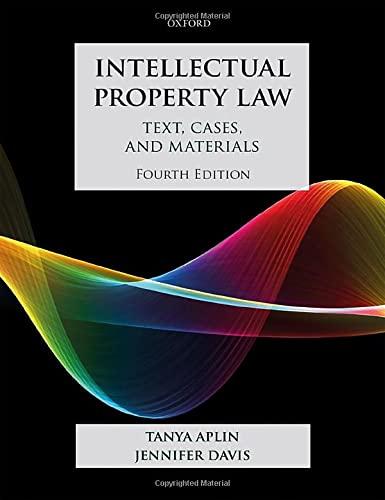Question
Under customary international law and LOSC, ______________________ are defined as those waters inside (landward of) the baseline in rivers and juridical bays, which foreign flag
Under customary international law and LOSC, ______________________ are defined as those waters inside (landward of) the baseline in rivers and juridical bays, which foreign flag vessel may not enter without coastal state permission (except in cases of bona fide distress).
A.Territorial Seas
B.Internal waters
C.Archipelagic waters
D.Customs waters
True or False? Under the doctrine of hot pursuit, a state may exercise its jurisdiction over the fleeing ship within the territorial sea of another state without the consent of either the flag state or the coastal state as long as the pursuit is continuous.
True or False? All uses of force, including reprisals and retaliation, are governed by the twin principles of necessity and proportionality.
True or False? The laws of armed conflict apply to civil wars and rebellions, as well as conflicts between two or more states.
True or False? There is clear authority in the U.N. Charter for the U.N. to intervene in purely internal matters which are within the domestic jurisdiction of a state.
_____________________ during an armed conflict is considered a war crime.
A.Attempting to escape from a POW camp
B.Accidentally killing civilians during combat operations.
C.Acts of terrorism against civilians
D.None of the above.
True or False? All states must grant political asylum to any individual who can demonstrate a well founded fear of persecution for reasons of race, religion, nationality, membership in a particular social group, or political opinion.
True or False? U.N. peacekeeping missions are specifically provided for in the U.N. Charter.
The ____________________________ occupies the same "founding" position in the area of environmental law, as the Universal Declaration of Human Rights has in the evolution and development of human rights law.
A.Stockholm Declaration on the Human Environment
B.Rio Declaration
C.Bonn Convention
D.Trail Smelter decision
True or False? In the view of the United States, all treaties are self-executing and require no enabling legislation.
Under international law, a coastal state may exercise jurisdiction without the consent of the flag state over a foreign flag vessel engaged in _________________________ beyond the territorial sea up to a maximum of 24 nautical miles (contiguous zone) from the baseline.
A.drug smuggling
B.counterfeiting
C.transporting illegal immigrants
D.all of the above
True or False The Rio Declaration binds developed countries to specific legal obligations in the area of sustainable development because of the technologies and financial resources they command.
The ___________________ is the concept that a state may exercise jurisdiction over conduct outside its territory if that conduct is universally dangerous to states and their nationals.
A.Universality Principle
B.Protective Principle
C.Passive Personality Principle
D.Territorial Principle
True or False? If a diplomat is immune from national jurisdiction for crimes against humanity, they may still be liable under international jurisdiction.
True or False? The U.N. Security Council has authorized the use of armed force to restore peace in a state, even though that state posed no armed threat to any other state.
True or False? International humanitarian law, also known as the law of armed conflict, protects persons who are not or are no longer participating in hostilities, and restricts the means and methods of warfare.
The most important source of marine pollution in need of international regulations is ______________.
A.Sea Oil Drilling
B.Land-Based Activities
C.Dumping of Waste by Sea Vessels and Aircraft
D.Oil Shipping Disasters
True or False? Only international organizations, not states, may request ICJ advisory opinions
Under the ________________, the U.S. courts generally decline to "sit in judgment" on the acts of a foreign government when those acts are taken within the foreign government's territory.
A.Act of State Doctrine
B.Diplomatic Immunities Doctrine
C.Commercial Activities Doctrine
D.Foreign Sovereign Immunities Doctrine
Step by Step Solution
There are 3 Steps involved in it
Step: 1

Get Instant Access to Expert-Tailored Solutions
See step-by-step solutions with expert insights and AI powered tools for academic success
Step: 2

Step: 3

Ace Your Homework with AI
Get the answers you need in no time with our AI-driven, step-by-step assistance
Get Started


